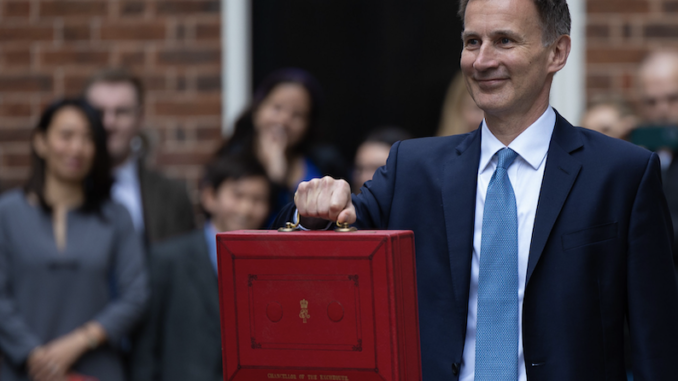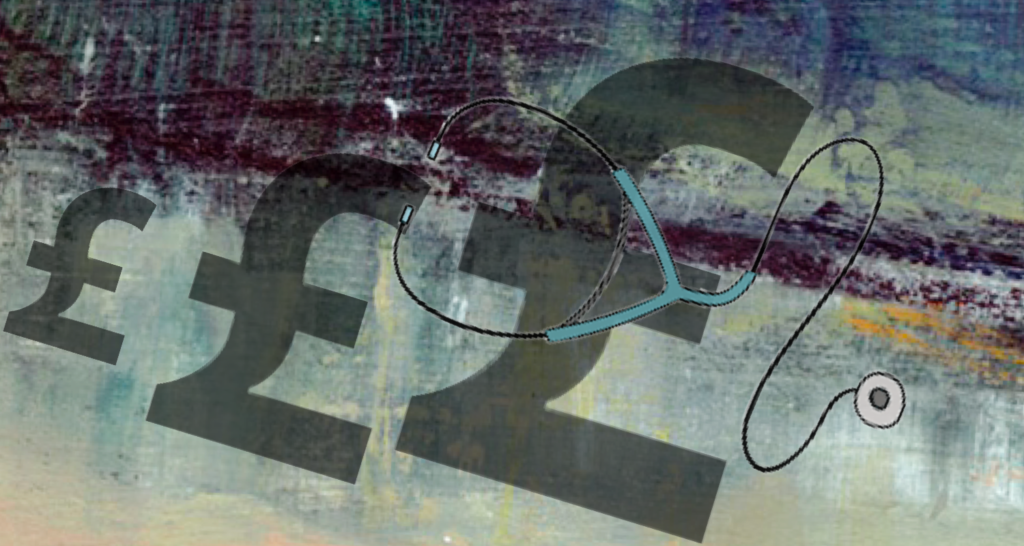
Keep Our NHS Public Press Officer Samantha Wathen explains why Chancellor Jeremy Hunt’s budget is mere smoke and mirrors.
On first glance Wednesday’s Spring Budget may have seemed positive for the NHS. A total of nearly £6bn was allocated, but dig a little deeper and the offering comes with strings attached, barely helping to keep the health service’s head above water.
Chancellor Jeremy Hunt (no friend of the NHS based on past behaviour), began by allocating £3.4bn of public money to the NHS to modernise antiquated NHS IT systems. While potentially beneficial for day-to-day working, AI and technological innovations are unlikely to deliver the efficiencies they seek (an annual 2% increase in productivity). The money will be spread over 3 years and wont materialise until 2025/6 making it the next government’s problem and therefore only a hypothetical possibility.
This was optimistically billed by Hunt (the man who, when Health Secretary, promised a paperless NHS by 2018) as something that would create £35bn in efficiency savings through streamlined processes and diagnostics. However, Thea Stein of The Nuffield Trust labelled this target as at best ‘a stretch’ when speaking on Radio 4 the day after the budget, saying that these predicted productivity savings were based on ‘heroic assumptions about digital and AI [and the announcement didn’t feel] nested in a co-produced piece of work’.
Style over substance?
NHS managers need to know that these targets are not simply imposed upon them from above, but rather come from peers who understand the unique challenges that working in the NHS brings.
Health Secretary Victoria Atkins proudly announced at the Nuffield Trust Summit on Thursday, that former M&S boss Steve Rowe had been appointed as NHS Productivity Tsar. She said:
However, this is a well-trodden road and not the first time the Conservatives have drawn upon industry managers to ‘fix the NHS’. In 2015, Prime Minister David Cameron employed the former M&S boss in much the same way. He came up with 19 recommendations, none of which were implemented.
In 1983 Prime Minister Margaret Thatcher attempted to solve problems by bringing in Roy Griffiths, the boss of the supermarket chain Sainsburys, as a key advisor to the government on the NHS. Roy Griffiths spent his tenure overseeing removal of long-term care from the NHS and the introduction of means testing and privatisation of care, resulting in the current lamentable state of social care.
Historically managers from big business have never stayed for long, perhaps the enormous challenges the NHS poses or the salaries offered just aren’t worth the hassle. Those with clinical and/or specialist backgrounds who are better suited to take on these roles and choose to do them are usually side-stepped.

NHS funding on a knife edge
With several English councils at risk of bankruptcy, nothing was offered by the Chancellor for social care, a key driver of the long waits and lack of capacity in the NHS through the inability to discharge medically fit patients back into the community with the required care support. Yes, cutting-edge technology is important, but hospital flow and bed numbers are a more pressing consideration. Time will tell whether this increase in the budget for innovation and AI simply results in more money handed out to Tory donors and friends for little in the way of returns. This government has a poor track record when it comes to managing issues related to confidential health data. Arguably the last thing we need is increased involvement of huge corporations and a lack of transparency. The ink is barely dry on the budget and already there is talk of the NHS app being used to monitor patients without their explicit consent.
Despite an award of £2.5bn to ‘meet NHS pressures’ and ‘reduce waiting times’, none of this was for general practice – the front door to the NHS and arguably the area which most impacts the day to day lives of the public. This money is woefully inadequate given the NHS was already facing a £2bn funding deficit this year. The Institute for Fiscal Studies warned that without a cash injection of at least £2bn, health spending in England will fall next year in real terms. Its director Paul Johnson took to social media platform X to say that the extra £2.5bn for the NHS next year was in fact ‘just enough to stop spending falling compared to this year’ but was not an increase on this year’s spending. Matthew Taylor, chief executive of the NHS Confederation, said the £2.5bn would ‘scarcely touch the sides … [and] may just about stop things from worsening’ for the service.
In addition, £1bn has already been recently raided from NHS capital budgets to go towards strike related costs. In essence Hunt is giving with one hand, but taking away with the other.
More smoke and mirrors
With waiting lists for elective treatments of nearly 8 million, some doctors still forced to take strike action over low pay, and numbers of targets in all areas vastly weakened, the NHS is now a shadow of its former self.
Conservatives cannot admit that the dire state of the NHS, all too clear to the electorate, is a consequence of their policies since in office. After nearly 14 years of underfunding compared to need, it is not enough to pay for some new computers and walk away. Real, meaningful increased funding and staffing in line with comparable European neighbours is urgently needed, as well as awarding staff a proper pay rise.
Without these interventions it is not possible to envision a return to a well-functioning health service that the population, and the economy both needs and deserves. It’s up to us to fight for it.
Samantha Wathen is the Press and Media Officer for Keep Our NHS Public

Leave a Reply